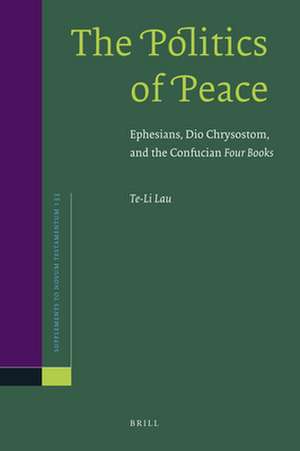The Politics of Peace: Ephesians, Dio Chrysostom, and the Confucian Four Books: Novum Testamentum, Supplements, cartea 133
Autor Te-Li Lauen Limba Engleză Hardback – 6 dec 2009
Din seria Novum Testamentum, Supplements
- 18%
 Preț: 1035.97 lei
Preț: 1035.97 lei - 18%
 Preț: 909.38 lei
Preț: 909.38 lei - 18%
 Preț: 952.99 lei
Preț: 952.99 lei - 18%
 Preț: 844.08 lei
Preț: 844.08 lei - 18%
 Preț: 610.52 lei
Preț: 610.52 lei -
 Preț: 370.87 lei
Preț: 370.87 lei - 18%
 Preț: 851.93 lei
Preț: 851.93 lei - 18%
 Preț: 1058.34 lei
Preț: 1058.34 lei - 18%
 Preț: 1006.73 lei
Preț: 1006.73 lei - 18%
 Preț: 1176.35 lei
Preț: 1176.35 lei - 18%
 Preț: 761.68 lei
Preț: 761.68 lei - 18%
 Preț: 1163.11 lei
Preț: 1163.11 lei - 18%
 Preț: 633.24 lei
Preț: 633.24 lei - 18%
 Preț: 857.49 lei
Preț: 857.49 lei -
 Preț: 265.58 lei
Preț: 265.58 lei - 18%
 Preț: 1528.39 lei
Preț: 1528.39 lei - 18%
 Preț: 701.66 lei
Preț: 701.66 lei - 18%
 Preț: 971.04 lei
Preț: 971.04 lei - 18%
 Preț: 698.57 lei
Preț: 698.57 lei - 18%
 Preț: 1056.67 lei
Preț: 1056.67 lei - 18%
 Preț: 1417.32 lei
Preț: 1417.32 lei - 18%
 Preț: 591.19 lei
Preț: 591.19 lei - 18%
 Preț: 772.47 lei
Preț: 772.47 lei -
 Preț: 388.70 lei
Preț: 388.70 lei - 18%
 Preț: 992.69 lei
Preț: 992.69 lei - 18%
 Preț: 996.01 lei
Preț: 996.01 lei - 18%
 Preț: 1099.20 lei
Preț: 1099.20 lei - 18%
 Preț: 834.10 lei
Preț: 834.10 lei - 18%
 Preț: 968.84 lei
Preț: 968.84 lei - 18%
 Preț: 865.98 lei
Preț: 865.98 lei - 18%
 Preț: 909.35 lei
Preț: 909.35 lei - 18%
 Preț: 869.05 lei
Preț: 869.05 lei - 18%
 Preț: 865.22 lei
Preț: 865.22 lei - 18%
 Preț: 1074.32 lei
Preț: 1074.32 lei -
 Preț: 382.68 lei
Preț: 382.68 lei - 18%
 Preț: 797.87 lei
Preț: 797.87 lei - 18%
 Preț: 834.39 lei
Preț: 834.39 lei - 18%
 Preț: 1109.43 lei
Preț: 1109.43 lei - 18%
 Preț: 853.02 lei
Preț: 853.02 lei - 18%
 Preț: 867.45 lei
Preț: 867.45 lei - 18%
 Preț: 1236.51 lei
Preț: 1236.51 lei - 18%
 Preț: 692.48 lei
Preț: 692.48 lei - 18%
 Preț: 807.09 lei
Preț: 807.09 lei -
 Preț: 388.70 lei
Preț: 388.70 lei - 18%
 Preț: 625.87 lei
Preț: 625.87 lei - 18%
 Preț: 816.77 lei
Preț: 816.77 lei - 18%
 Preț: 687.53 lei
Preț: 687.53 lei - 18%
 Preț: 684.43 lei
Preț: 684.43 lei - 18%
 Preț: 650.21 lei
Preț: 650.21 lei
Preț: 832.84 lei
Preț vechi: 1015.65 lei
-18% Nou
Puncte Express: 1249
Preț estimativ în valută:
159.37€ • 166.73$ • 132.38£
159.37€ • 166.73$ • 132.38£
Carte indisponibilă temporar
Doresc să fiu notificat când acest titlu va fi disponibil:
Se trimite...
Preluare comenzi: 021 569.72.76
Specificații
ISBN-13: 9789004180536
ISBN-10: 9004180532
Pagini: 360
Dimensiuni: 160 x 240 x 25 mm
Greutate: 0.75 kg
Editura: Brill
Colecția Brill
Seria Novum Testamentum, Supplements
ISBN-10: 9004180532
Pagini: 360
Dimensiuni: 160 x 240 x 25 mm
Greutate: 0.75 kg
Editura: Brill
Colecția Brill
Seria Novum Testamentum, Supplements
Notă biografică
Te-Li Lau, Ph.D. (2008) in Religion, Emory University, is Assistant Professor of New Testament at Trinity Evangelical Divnity School.
Recenzii
'Lau must be applauded for juggling a huge range of primary and secondary literature in an interesting manner and for offering extensive, helpful footnotes to comparative ancient and other texts, as well as scholarly discussions and additional resources throughout his book. [...] will [be] useful to New Testament scholars or anyone interested in comparative studies of Greek, Jewish, early Christian, and Confucian thought. It complements the discussion of Ephesians’ use of Greco-Roman values by Daniel Darko (2008) and the discussion of ethnic reconciliation by Tet-Lim Yee (2005).'
Minna Shkul, RBL 12/2012
Minna Shkul, RBL 12/2012
